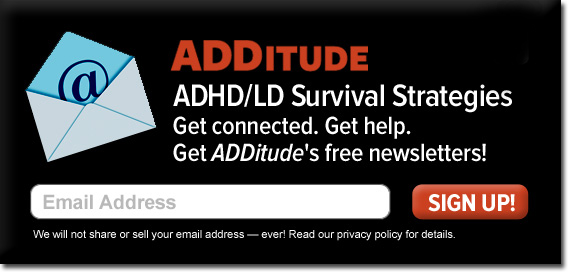ADHD is a medical disorder, affecting more than 15 million Americans, with symptoms -- distractibility, impulsivity, hyperactivity -- that seriously interfere with the ability to function. But children and adults with ADHD can do well, even excel, when they receive help and support.
ADHD affects people of all ages, races, and both genders. That's why this year's Awareness Week is called The Many Faces of ADHD. Enlighten the world about ADHD by sharing your own story -- and use these seven strategies to broadcast the message.
1. BUST SOME MYTHS. Print copies of "7 Myths about ADHD...Debunked!" and hand them out to teachers, friends, and relatives. Leave copies at local libraries, doctors' offices, and schools.
2. BREAK THE NEWS. Contact your local newspaper or TV station. Tell the editors or producers about ADHD Awareness Week, and urge them to prepare related stories -- about high-achieving local ADDers, about the medical aspects of ADHD, about a teacher you think has been helpful. Write a letter to the editor of the newspaper, or submit an op-ed piece, talking about the different people you know with ADHD.
3. SHOOT OFF E-MAILS. Add a mention of ADHD Awareness Week to your e-mail signature. Include an important fact, such as, "The American Psychiatric Society recognized ADHD as a medical disorder in 1980," or, "3 to 5 percent of school-age children have ADHD." Have your friends with ADHD do the same thing.
4. GO TO SCHOOL. Contact your child's teachers, and explain how ADHD affects your child. Make a game plan for how you can work together. (Be sure to send a thank-you note after the meeting.) We've compiled a page of resources for teachers, including an introductory letter, a list of classroom accommodations, and many helpful articles. Ask the principal whether you can give a packet to every teacher at the school.
5. SCHEDULE A TALK. Work with the parent-teacher organization at your child's school to create an ADHD education program for students, teachers, and administrators. Invite an ADHD specialist to speak or conduct a workshop. Hand out "7 Myths about ADHD" to those at the event.
6. DONATE A BOOK. Lobby the head librarian of your local library (or your child's school library), and suggest that the library prominently display ADHD books that you are donating (suggestions to the left), as well as resources during ADHD Awareness Week.
7. GIVE A GIFT THAT KEEPS ON GIVING. Give a subscription to ADDitude to your child's teacher or pediatrician.
This article appears in the Fall 2012 issue of ADDitude.
SUBSCRIBE TODAY to ensure you don't miss a single issue.
Tell us about what you are doing for ADHD Awareness Week in the ADHD Adults support group on ADDConnect.





